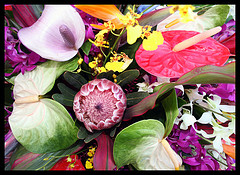 The term "anthology" derives from the Greek word anthologia which means to gather or collect flowers. The term has been extended to describe literary or artistic collections, so we now think of an anthology as a collection of works (poems, stories, artwork, songs) brought together into one place.
The term "anthology" derives from the Greek word anthologia which means to gather or collect flowers. The term has been extended to describe literary or artistic collections, so we now think of an anthology as a collection of works (poems, stories, artwork, songs) brought together into one place.
This course will further extend this term by developing a practice that we'll call anthologics - a method of bringing together a conversation of various texts, arguments, and voices and then entering into that conversation. The conversations we will be constructing and entering will involve the city of Detroit. The city is often used as a case study for discussions of a shifting economy, as a paradigmatic case of a contemporary urban infrastructures, and as a locus of musical and cultural influence. Students will spend the semester collaboratively researching and compiling anthologies about Detroit. They will choose the texts that will make up their anthology, write a book proposal for a publisher, and write a preface for their text. This anthology will be a way of presenting readers with a "conversation" about Detroit. The main goal of the anthologic method is to understand that writers are always entering ongoing conversations and that such conversations involve writers from different backgrounds, disciplines, and cultures. The course will pay particularly close attention to how scholars in different disciplines across the university (in the humanities, sciences, and social sciences) argue differently and present different kinds of evidence. In addition to editing an anthology, students will also apply the anthologic method to video footage by creating a video mashup. The video mashup will explore the collisions and overlaps amongst various pieces of video footage.
Assignments in this course will all build toward students' final anthology project. Students will complete short writing assignments that summarize and analyze texts and longer writing assignments that will propose their anthology to a publisher and provide an introduction for their edited collection. Since we are designing a book, we will also discuss design issues. To this end, we'll ask questions such as: What will the anthology look like? How will it be organized? Who is the audience? What publisher might be interested in distributing such an anthology?
[Image Credit: Hawaii Flower Bouquet by R.J. Malfalfa]
